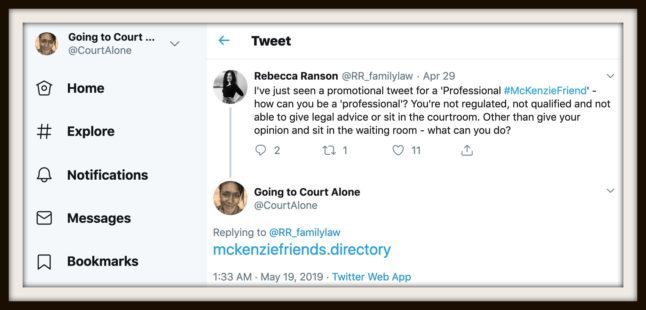I have never been one to join in with social media rants, but a tweet I spotted on Twitter today (19th May 2019), can not and must not go unchallenged.
The tweet in question, ‘hashtag McKenzieFriend’, was written by a solicitor who took exception to me calling myself a ‘Professional McKenzie Friend’.
In her tweet (see the above image), the solicitor referenced one of my promotional tweets and went on to assert that I was ‘not regulated, not qualified and not able to give legal advice or sit in the courtroom’.
This esteemed legal professional went on to add that all I could do was give my ‘opinion and sit in the waiting room’.
Issue, rule, analysis and conclusion
During my law degree, I was taught that legal problems should be approached by exploring the issues and the rules, analysing the facts and rules before finally, drawing a conclusion.
It is interesting that this particular rant, by this ill-informed solicitor demonstrated no understanding of the issue, a lack of knowledge of the rules and was almost entirely devoid of facts.
Had this solicitor bothered to carry out a rudimentary online search, she might have thought carefully before drawing conclusions that led her to publish statements about me that are not true and are, quite frankly, defamatory.
Statements of this nature about an individual in writing and in a public online arena are unacceptable.
McKenzie Friend Practice Guidance
While it is true that the work of McKenzie Friends (whether or not a McKenzie Friend calls him or herself professional) remains unregulated, McKenzie Friends, particularly those who attend hearings, must adhere to the McKenzie Friend Practice Guidance for family and civil courts.
Under the Practice Guidance, McKenzie Friends may:
- provide moral support for litigants
- take notes
- help with case papers
- quietly give advice on any aspect of the conduct of the case
The guidance also allows ‘the provision of legal advice in connection with court proceedings’.
Reforms to the courts’ approach to McKenzie Friends has recently been the subject of a consultation by the Judicial Executive Board. Any steps deemed necessary to improve access to justice, legal advice and representation will be taken by the government, at the appointed time.
In the meantime, McKenzie Friends continue to fill an ever-widening gap in the legal services market; assisting those who do not qualify for legal aid or who can not, or can no longer afford to pay for a solicitor or barrister.
Litigants in person (those who represent themselves in court without a lawyer), have the right to reasonable assistance and this assistance often arrives in the form of a McKenzie Friend.
Professional means something!
I am a Professional McKenzie Friend and I carry out my work to a professional standard in a specified area of activity.
I am:
- legally qualified
- a member of the McKenzie Friend Organisation
- a full member of the Society of Professional McKenzie Friends (a voluntary self-regulatory body)
- fully insured – through professional indemnity insurance
I adhere to the:
- Practice Guidance: McKenzie Friends (Civil and Family Courts)
- Society of Professional McKenzie Friends Code of Conduct for McKenzie Friends
As a professional, I take the work that I do very seriously and the assistance I give to my clients is based on the facts of their case, the law and my years of experience – particularly the years I spent in courts successfully representing myself against solicitors and barristers as a litigant in person.
As a professional, I would never dream of seeking to diminish the work of another person.
As a professional, I would never misrepresent the facts about an individual as a way of registering my own dissatisfaction with the way that a particular individual chooses to label the services they provide.
As a professional, I respect the work of others and I focus on doing the work that clients pay me to do, to the very highest standards.
As a professional, I do not post offensive material online about anyone.
And I would expect no less of others.
Update:
The day after I sent a written complaint to the Managing Partner of the law firm (where the solicitor in question works), the offending tweet was taken down.
Copyright © Going to Court Alone – Debbie Thomas

